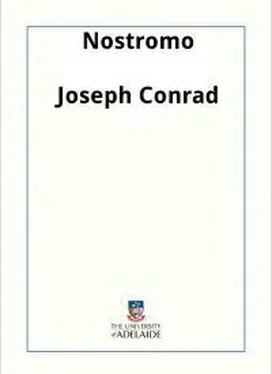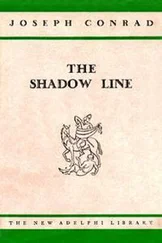Джозеф Конрад - Nostromo - A Tale of the Seaboard
Здесь есть возможность читать онлайн «Джозеф Конрад - Nostromo - A Tale of the Seaboard» весь текст электронной книги совершенно бесплатно (целиком полную версию без сокращений). В некоторых случаях можно слушать аудио, скачать через торрент в формате fb2 и присутствует краткое содержание. Год выпуска: 2006, Жанр: Классическая проза, на английском языке. Описание произведения, (предисловие) а так же отзывы посетителей доступны на портале библиотеки ЛибКат.
- Название:Nostromo: A Tale of the Seaboard
- Автор:
- Жанр:
- Год:2006
- ISBN:нет данных
- Рейтинг книги:4 / 5. Голосов: 1
-
Избранное:Добавить в избранное
- Отзывы:
-
Ваша оценка:
- 80
- 1
- 2
- 3
- 4
- 5
Nostromo: A Tale of the Seaboard: краткое содержание, описание и аннотация
Предлагаем к чтению аннотацию, описание, краткое содержание или предисловие (зависит от того, что написал сам автор книги «Nostromo: A Tale of the Seaboard»). Если вы не нашли необходимую информацию о книге — напишите в комментариях, мы постараемся отыскать её.
Nostromo: A Tale of the Seaboard — читать онлайн бесплатно полную книгу (весь текст) целиком
Ниже представлен текст книги, разбитый по страницам. Система сохранения места последней прочитанной страницы, позволяет с удобством читать онлайн бесплатно книгу «Nostromo: A Tale of the Seaboard», без необходимости каждый раз заново искать на чём Вы остановились. Поставьте закладку, и сможете в любой момент перейти на страницу, на которой закончили чтение.
Интервал:
Закладка:
They were a good sample of the cavalry of the plains with which Pedro Montero had helped so much the victorious career of his brother the general. The influence which that man, brought up in coast towns, acquired in a short time over the plainsmen of the Republic can be ascribed only to a genius for treachery of so effective a kind that it must have appeared to those violent men but little removed from a state of utter savagery, as the perfection of sagacity and virtue. The popular lore of all nations testifies that duplicity and cunning, together with bodily strength, were looked upon, even more than courage, as heroic virtues by primitive mankind. To overcome your adversary was the great affair of life. Courage was taken for granted. But the use of intelligence awakened wonder and respect. Stratagems, providing they did not fail, were honourable; the easy massacre of an unsuspecting enemy evoked no feelings but those of gladness, pride, and admiration. Not perhaps that primitive men were more faithless than their descendants of to-day, but that they went straighter to their aim, and were more artless in their recognition of success as the only standard of morality.
We have changed since. The use of intelligence awakens little wonder and less respect. But the ignorant and barbarous plainsmen engaging in civil strife followed willingly a leader who often managed to deliver their enemies bound, as it were, into their hands. Pedro Montero had a talent for lulling his adversaries into a sense of security. And as men learn wisdom with extreme slowness, and are always ready to believe promises that flatter their secret hopes, Pedro Montero was successful time after time. Whether only a servant or some inferior official in the Costaguana Legation in Paris, he had rushed back to his country directly he heard that his brother had emerged from the obscurity of his frontier commandancia. He had managed to deceive by his gift of plausibility the chiefs of the Ribierist movement in the capital, and even the acute agent of the San Tome mine had failed to understand him thoroughly. At once he had obtained an enormous influence over his brother. They were very much alike in appearance, both bald, with bunches of crisp hair above their ears, arguing the presence of some negro blood. Only Pedro was smaller than the general, more delicate altogether, with an ape-like faculty for imitating all the outward signs of refinement and distinction, and with a parrot-like talent for languages. Both brothers had received some elementary instruction by the munificence of a great European traveller, to whom their father had been a body-servant during his journeys in the interior of the country. In General Montero’s case it enabled him to rise from the ranks. Pedrito, the younger, incorrigibly lazy and slovenly, had drifted aimlessly from one coast town to another, hanging about counting-houses, attaching himself to strangers as a sort of valet-de-place, picking up an easy and disreputable living. His ability to read did nothing for him but fill his head with absurd visions. His actions were usually determined by motives so improbable in themselves as to escape the penetration of a rational person.
Thus at first sight the agent of the Gould Concession in Sta. Marta had credited him with the possession of sane views, and even with a restraining power over the general’s everlastingly discontented vanity. It could never have entered his head that Pedrito Montero, lackey or inferior scribe, lodged in the garrets of the various Parisian hotels where the Costaguana Legation used to shelter its diplomatic dignity, had been devouring the lighter sort of historical works in the French language, such, for instance as the books of Imbert de Saint Amand upon the Second Empire. But Pedrito had been struck by the splendour of a brilliant court, and had conceived the idea of an existence for himself where, like the Duc de Morny, he would associate the command of every pleasure with the conduct of political affairs and enjoy power supremely in every way. Nobody could have guessed that. And yet this was one of the immediate causes of the Monterist Revolution. This will appear less incredible by the reflection that the fundamental causes were the same as ever, rooted in the political immaturity of the people, in the indolence of the upper classes and the mental darkness of the lower.
Pedrito Montero saw in the elevation of his brother the road wide open to his wildest imaginings. This was what made the Monterist pronunciamiento so unpreventable. The general himself probably could have been bought off, pacified with flatteries, despatched on a diplomatic mission to Europe. It was his brother who had egged him on from first to last. He wanted to become the most brilliant statesman of South America. He did not desire supreme power. He would have been afraid of its labour and risk, in fact. Before all, Pedrito Montero, taught by his European experience, meant to acquire a serious fortune for himself. With this object in view he obtained from his brother, on the very morrow of the successful battle, the permission to push on over the mountains and take possession of Sulaco. Sulaco was the land of future prosperity, the chosen land of material progress, the only province in the Republic of interest to European capitalists. Pedrito Montero, following the example of the Duc de Morny, meant to have his share of this prosperity. This is what he meant literally. Now his brother was master of the country, whether as President, Dictator, or even as Emperor—why not as an Emperor?—he meant to demand a share in every enterprise—in railways, in mines, in sugar estates, in cotton mills, in land companies, in each and every undertaking—as the price of his protection. The desire to be on the spot early was the real cause of the celebrated ride over the mountains with some two hundred llaneros, an enterprise of which the dangers had not appeared at first clearly to his impatience. Coming from a series of victories, it seemed to him that a Montero had only to appear to be master of the situation. This illusion had betrayed him into a rashness of which he was becoming aware. As he rode at the head of his llaneros he regretted that there were so few of them. The enthusiasm of the populace reassured him. They yelled “Viva Montero! Viva Pedrito!” In order to make them still more enthusiastic, and from the natural pleasure he had in dissembling, he dropped the reins on his horse’s neck, and with a tremendous effect of familiarity and confidence slipped his hands under the arms of Senores Fuentes and Gamacho. In that posture, with a ragged town mozo holding his horse by the bridle, he rode triumphantly across the Plaza to the door of the Intendencia. Its old gloomy walls seemed to shake in the acclamations that rent the air and covered the crashing peals of the cathedral bells.
Pedro Montero, the brother of the general, dismounted into a shouting and perspiring throng of enthusiasts whom the ragged Nationals were pushing back fiercely. Ascending a few steps he surveyed the large crowd gaping at him and the bullet-speckled walls of the houses opposite lightly veiled by a sunny haze of dust. The word “ Pourvenir ” in immense black capitals, alternating with broken windows, stared at him across the vast space; and he thought with delight of the hour of vengeance, because he was very sure of laying his hands upon Decoud. On his left hand, Gamacho, big and hot, wiping his hairy wet face, uncovered a set of yellow fangs in a grin of stupid hilarity. On his right, Senor Fuentes, small and lean, looked on with compressed lips. The crowd stared literally open-mouthed, lost in eager stillness, as though they had expected the great guerrillero, the famous Pedrito, to begin scattering at once some sort of visible largesse. What he began was a speech. He began it with the shouted word “Citizens!” which reached even those in the middle of the Plaza. Afterwards the greater part of the citizens remained fascinated by the orator’s action alone, his tip-toeing, the arms flung above his head with the fists clenched, a hand laid flat upon the heart, the silver gleam of rolling eyes, the sweeping, pointing, embracing gestures, a hand laid familiarly on Gamacho’s shoulder; a hand waved formally towards the little black-coated person of Senor Fuentes, advocate and politician and a true friend of the people. The vivas of those nearest to the orator bursting out suddenly propagated themselves irregularly to the confines of the crowd, like flames running over dry grass, and expired in the opening of the streets. In the intervals, over the swarming Plaza brooded a heavy silence, in which the mouth of the orator went on opening and shutting, and detached phrases—“The happiness of the people,” “Sons of the country,” “The entire world, el mundo entiero”—reached even the packed steps of the cathedral with a feeble clear ring, thin as the buzzing of a mosquito. But the orator struck his breast; he seemed to prance between his two supporters. It was the supreme effort of his peroration. Then the two smaller figures disappeared from the public gaze and the enormous Gamacho, left alone, advanced, raising his hat high above his head. Then he covered himself proudly and yelled out, “Ciudadanos!” A dull roar greeted Senor Gamacho, ex-pedlar of the Campo, Commandante of the National Guards.
Читать дальшеИнтервал:
Закладка:
Похожие книги на «Nostromo: A Tale of the Seaboard»
Представляем Вашему вниманию похожие книги на «Nostromo: A Tale of the Seaboard» списком для выбора. Мы отобрали схожую по названию и смыслу литературу в надежде предоставить читателям больше вариантов отыскать новые, интересные, ещё непрочитанные произведения.
Обсуждение, отзывы о книге «Nostromo: A Tale of the Seaboard» и просто собственные мнения читателей. Оставьте ваши комментарии, напишите, что Вы думаете о произведении, его смысле или главных героях. Укажите что конкретно понравилось, а что нет, и почему Вы так считаете.












